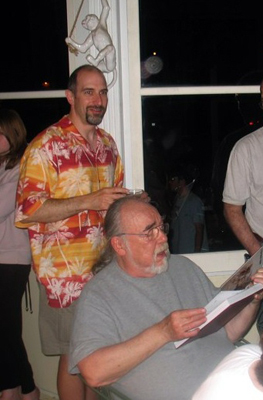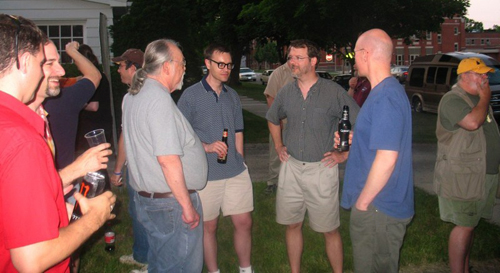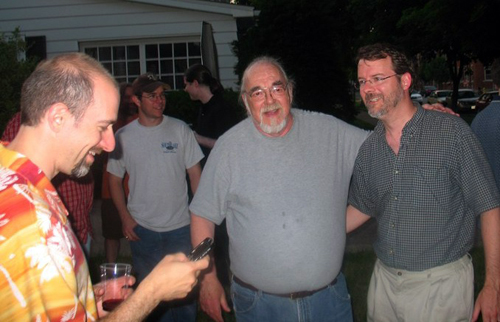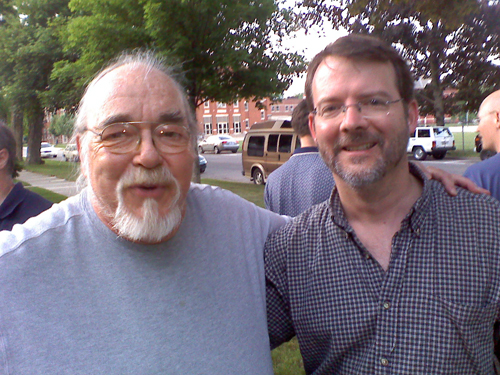A Tribute to Gary Gygax (1938-2008)
A Black Gate Symposium
Copyright 2008 by New Epoch Press. All rights reserved.
 E. Gary Gygax, 1938-2008
E. Gary Gygax, 1938-2008
Gary Gygax, the co-creator of Dungeons & Dragons and the spiritual father of the role-playing game phenomenon, died at his home March 4 after several years of declining health. Black Gate has collected the reminiscences of several Gygax admirers for your edification. Together they offer but a small hint of the vast influence that Gygax had over the field.
Leo Grin, Black Gate website editor and editor of The Cimmerian:
One of the seminal influences in fantasy in the twentieth century has left us for Valhalla. Gygax was a giant, a man whose enthusiasm and sense of adult play took a weird cerebral offshoot of board and strategy games and turned it into an accessible, endlessly stimulating, life-changing mythology for the Star Wars/Lancer Conan/”Frodo Lives!” generation of the 1970s and 80s. Those of us who risked life, limb, and reputation carrying our Player’s Handbooks and Monster Manuals cover-out through the hallways of Catholic school owe to him a large part of our imagination and happiness during those years.
As expressed in Bill Cavalier’s Gygax-heavy “The Other REH Days” in The Cimmerian V4n5, Gary created his game out of a host of fantasy influences, many of them writers long since forgotten in modern circles, and as a result D&D had the effect of introducing a whole new generation to the likes of REH, Leiber, Vance, and (despite Gygax’s protestations) Tolkien. I discovered D&D on the same Boy Scout camping trip that introduced me to The Two Towers, and life has never been the same since. And although I haven’t played the game since high school over twenty years ago, in terms of cultural and imaginative influence it has never been far from my mind. It was D&D that led me to fantasy as a genre, D&D that lured me to films like Conan the Barbarian and Excalibur and then to Robert E. Howard and classic mythology, D&D that forged for me the best friendships of my youth, D&D that spurred me to want to write and create in the realms of the magical and fantastic. For better or worse — let us be charitable and say mostly for the better — D&D is responsible for many of the tropes of modern fantasy literature. The open-ended nature of role-playing campaigns surely trained readers to crave longer and more numerous books than Tolkien’s trilogy, and the mashing together of various styles within a D&D game had much to do with the way later authors developed their fictional worlds. More than a few writers began their successful book series not as short stories or outlines but as D&D campaigns, with worlds and heroes built up over many years of gaming before ever being set into prose.
I met Gygax just once, at Gen Con in 1987. At the time he was on the outs in the industry, having been effectively shit-canned from his own company, TSR, and forced to eke out his role-playing living developing new, ultimately unsuccessful games on his own, trying vainly to make cultural lightening strike twice. Painfully shy but I suppose somewhat less so than many in the Milwaukee Convention Center on that day, I walked up to him and proffered a copy of his novel Sea of Death for autographing, mumbling something about how much I liked it. He was warm and gracious, and if I had possessed any social skills in those days I may have struck up a conversation about any number of subjects. But I didn’t — I ran back to my Mom and walked away, leaving him sitting there alone in a Hawaiian shirt, just another booth guy watching the teeming hordes of teenaged boys and older ex-hippies walk by, a king invisible in the kingdom he built. Things got better for him in his later years, as TSR was rescued from its suicidally bad post-Gygax management, and both it and Gen Con fell into the arms of people — Peter Adkison prime among them — who understood the peculiar imaginative alchemy which lies at the heart of D&D’s appeal, and who greatly respected the mind of the man who had conjured it into a post-Vietnam America, an America that in hindsight desperately needed it.
There doubtless will be memorials galore for Gygax throughout this year, culminating at Gen Con in August, but I had to get this little paean out as soon as I heard the news. William Buckley, the founder of National Review, died last week. It’s not out of line to say that Gygax was the WFB of fantasy, a guy who never ran for president or fought a world war, but whose vision and philosophy made a movement out of vast groups of scattered and disheartened peoples, one gamer-one author-one visionary at a time. “The material is herein,” Gygax wrote in his Introduction to the first edition of The Dungeon Master’s Guide, “but only you can construct the masterpiece from it.” Ever enticing, ever encouraging, ever dreaming the boldest and bravest dreams. That is the legacy of Gary Gygax, and it lives in the hearts of millions of people around the world.
(This reminiscence was originally published at The Cimmerian.)
 Dave Kenzer and Gary Gygax with Aces & Eights.
Dave Kenzer and Gary Gygax with Aces & Eights.
Erik Mona, Planet Stories editor and publisher:
The galley proofs for Gary Gygax’s novel, The Samarkand Solution, are sitting on my desk right now, ready for the final check-off before we send the book to the printer. Sitting above my desk, packed into little cardboard sleeves, are dozens of copies of Dragon, the original RPG magazine for which Gygax served as publisher in its earliest days. Until recently, I served as publisher of that magazine, and it always made me proud to know I was following in Gary Gygax’s august footsteps.
Gary died this morning in his sleep, bringing to an end a decades-spanning career that created an industry and brought joy to millions of people. The game he created with Dave Arneson — Dungeons & Dragons — has had a more profound influence upon my life than any other factor save my family, and his passing has affected me deeply.
When I was a kid growing up with D&D, Gygax’s name was on the cover of just about every official product. He wrote the best adventure modules, he set the template for all future campaign settings with the World of Greyhawk, and perhaps most importantly he introduced a generation of kids to a game that was more than a game. I’ve met many of my closest friends in the span of my entire life because of Gary Gygax.
Last year, I launched Planet Stories, a line of fantasy and science-fiction trade paperbacks aimed at reprinting some of the classic works of sword & sorcery that inspired Dungeons & Dragons and fantasy gaming in general. In the AD&D Dungeon Master’s Guide, a fascinating work that surely serves as Gygax’s masterpiece, Gary thoughtfully included “Appendix N: Inspirational and Educational Reading,” a list that included such luminaries as Michael Moorcock, Robert E. Howard, Edgar Rice Burroughs, Lin Carter, Fritz Leiber, H. P. Lovecraft, A. Merritt, Jack Vance, and more.
So in addition to my friends and my career, I also owe Gary Gygax an unpayable debt of gratitude for introducing me to the greatest fantasists who ever lived and a lifetime of excellent reading. Planet Stories is, in some small sense, my attempt to repay that debt by bringing many of these fine authors back into print to be enjoyed again. Like Paizo Publishing itself, Planet Stories exists because of Gary Gygax. I chose to honor Gary by including several of his own exciting fantasy novels in the Planet Stories line, including the imprint’s very first release, The Anubis Murders.
It was the release of The Anubis Murders at last year’s Gen Con Indy that brought me and Gary together for the last time. As the show’s Guest of Honor, Gygax had more than a full schedule, but he was able to carve out a couple of hours a day to sit at the Paizo booth and sign autographs of his book while sharing thoughts and memories with his fans. And the stories those fans told were just incredible. For a full hour I listened as gamer after gamer approached Gary and told a variation of the exact same story: “Thank you for a game that has brought me so much joy. Thank you for a game that has brought me so many friends. Thank you for making such a positive impact on my life.”
Sitting next to Gary at last year’s Gen Con made me realize what a huge cultural impact Gary Gygax had made on all of us. Never before have I seen such honest appreciation. Never before had I been so moved and so proud to be working with a man who had made such an impact on my life. On all of our lives.
When a friend passes away, it is easy to be sad, to think about what might have been had he lived another year, another ten years. But my friends, I am here to tell you that Gary Gygax knew what a difference he had made in all of our lives, and he was proud to have made it.
Not bad for a life’s work.
I’ll miss you, Gary Gygax. We all will. Goodbye, my friend.
And thank you.
(This reminiscence was originally published at the Paizo blog.)
 Brian Jelke, Dave Kenzer, Gary Gygax, Steve Johansson,
Brian Jelke, Dave Kenzer, Gary Gygax, Steve Johansson,
John O’Neill, Mark Plemmons, Tim Kask.
Howard Jones, Managing Editor of Black Gate:
Some people light a candle or two in the house of imagination; Gary Gygax fired an immense bonfire, and one which has sparked countless other fires as well.
I know I’m not the only one who called up old gamer friends yesterday to mourn the passing of an age. Even if you haven’t played the game in a dog’s age, or a couple of dog’s ages, if you’ve gamed, you’ve been influenced by Gygax. And I don’t mean just pencil and paper gaming — the mindset behind D&D permeated electronic fantasy games and the newer online worlds. I haven’t used D&D mechanics for years (mostly because I, as the game master, can’t keep all those numbers and charts straight) — but D&D was the first role-playing game I ever played. Like countless others, if I hadn’t played THAT one, and if it had never existed, I would never have played the others. Countless hours of entertainment and inspiration can be traced back to the game Gygax helped create.
Lest we forget, Gygax also introduced gamers to fantasy literature. Those of you who had that first hardback Dungeon Master’s Guide may well remember the suggested reading list, mentioning such names as Howard and Leiber and Moorcock and Vance and so on. I remember heading to the library with that list. Gygax led me to Fritz Leiber’s Swords Against Death, which has remained one of my all-time favorite fantasy collections. I was talking with Black Gate‘s Ryan Harvey just last night, and he told me that list had introduced him to one of his very favorite writers, Clark Ashton Smith.
I never had the opportunity to meet the man, but his friends and family are in my thoughts. E. Gary Gygax was an opener of the ways. He will be missed.
(This reminiscence was originally published at the Black Gate blog.)
 Dave Kenzer, Gary Gygax, and John O’Neill.
Dave Kenzer, Gary Gygax, and John O’Neill.
John O’Neill, editor/publisher of Black Gate:
On Tuesday morning, March 4, I received a call from David Kenzer, publisher of Knight of the Dinner Table and the Hackmaster game. I was driving from my home in Chicago to Champaign, Illinois, my weekly commute to my day job at SourceGear, and heading into a fierce winter storm that was quickly becoming a blizzard.
“Gary Gygax just died,” Dave said.
When I was in high school, my teachers used to tell me “Everyone remembers exactly what they were doing when they heard Kennedy died.” It’s too early to tell of course, but I suspect that for a small group of North American males who attended high school at roughly the same time I did, the late ’70s and early ’80s, the same may be true of the death of Gary Gygax.
I spent most of the next hour crawling south on Highway 47 at about twenty-five miles per hour. By the time I arrived at my desk in downtown Champaign, there were several messages from friends and acquaintances with the news. Most of these people I’d known for close to thirty years. When you get to your mid-forties, you’ll understand that friends come and go, but those precious few who’ve stuck with you over the decades are worth any effort to keep. As I read through the messages, it was with the bittersweet realization that all these people were still in my life chiefly because of Gary Gygax. Gaming had brought us together, and kept us close over the years.
While I was reading our office manager Dixie came into my office, holding a phone and looking a little perplexed. “There’s an important call for you on the Sales line,” she said. No one calls me on the sales line. It was Howard Andrew Jones, telling me Gary Gygax had just died.
“Who the hell is Gary Gygap?” Mary Jo Skrobul asked at lunch.
“If geeks had a nation,” I said, groping for a way to explain, “he would have been our king.”
The New York Times, the BBC, CNN, and several other sites have done fine summaries of the highlights of Gary’s life, including the early success of his company TSR, and the eventual battles that saw him lose control and abruptly stop producing D&D material in the mid-’80s. One of the best and most concise was by the Associated Press. The quote that warmed my heart was:
Despite his declining health, he hosted weekly games of Dungeons & Dragons as recently as January.
Regardless of many major setbacks — including losing control of his creation, the lawsuit that took away Dangerous Journeys, his second major RPG, a heart attack, and much more — Gary remained a gamer to the end. Jolly R. Blackburn, creator of Knights of the Dinner Table, frequently returns to the theme of acceptance in his comic: the idea that those who struggle to fit in at work or social circles can often find unconditional acceptance at the gaming table…and learn a little about accepting others in the process. That idea started with Gary, and I like to think that he was proud to see it recognized as one of the greatest strengths of the role playing hobby.
For myself, I learned a great deal at the gaming table, and it has served me extraordinarily well. I’d been a Dungeon Master for over a dozen years by the time I entered the workforce, which meant that I had copious experience bringing people together around a table, gently guiding an argumentative team to the conclusion I wanted, running meetings and giving presentations with virtually no advance warning, and looking poised and in control when dealing with wildly unexpected situations.
Years later, sitting in Dave Kenzer’s office at Motorola as we worked together on a complex investment scheme, I put my feet on his desk and confided, “You know, I’ve negotiated to buy companies for a quarter of a billion dollars. I’ve started a few companies, and been on the Board of Directors of more. I’ve managed teams of salesmen. I studied English in Canada, and got a Ph.D. in Engineering in Illinois. And none of that — none of it — has prepared me for this job as much as being a Dungeon Master.”
“That’s the first thing you’ve said about this deal that’s made complete sense,” said Dave.
 Gary Gygax and John O’Neill.
Gary Gygax and John O’Neill.
Gary’s influence on modern fantasy fiction runs deeper than many of his readers appreciate. Most of us are aware of the fiction lines spawned by TSR in the ’80s and ’90s, including many best selling novels. Even outside TSR there are plenty of writers who cut their teeth on fantasy gaming supplements, such as the excellent Midkemia line by Raymond E. Feist, whose early work especially was strongly gaming-influenced. Other authors, such as Joel Rosenburg and Andre Norton, openly wrote independent fantasy gaming novels. And then there were writers such as Elizabeth Moon, whose second novel Divided Allegiance has been called “a stealth novelization of a classic old AD&D module, T1: The Village of Hommlet. Names changed to protect the guilty, but otherwise remarkably true to the source.”
Divided Allegiance was the first time in my fantasy reading career I was able to pull out a map and follow the action through the tight corridors of a Gygax adventure module. But it wasn’t the last.
Early last summer, Dave Kenzer called me up on a Saturday morning, and asked if I would like to come along to a porch party at Gary Gygax’s house. Would !? I got directions and headed north, meeting Dave and his fellow Kenzer & Co. teammates at Gary’s house in Lake Geneva, WI. I’d met Gary a handful of times before, but always at crowded conventions. This small party was lightly attended, perhaps twenty people, and Gary mingled freely. I was able to speak with him at length, and Dave was able to give Gary a copy of KenzerCo’s latest magnum opus, the newly-released Aces & Eights western role playing game.
Other members of the TSR old guard were also present, including Tim Kask, first editor of Dragon magazine, and Frank Metzner. For someone who grew up reading columns in Dragon magazine in the late ’70s, these were names to conjure with, and I alternated between wandering around and introducing myself, and tiptoeing quietly around Gary’s house, staring at the numerous gaming relics on display, terrified I would bump into a cabinet and destroy something.
Later in the evening most of the attendees gathered around Gary’s table, listening to stories from the early days of role playing. After that I hesitantly broached the topic of interviewing Gary for Black Gate. While he must have received many interview requests in his later years he acted genuinely enthusiastic, giving me his home phone number and encouraging me to call.
I knew I wanted to prepare carefully for that interview, however. And like so many things you pause to act on, the opportunity passed before I could seize it. I deeply regret that now.
Dave and Jolly Blackburn snapped some quick shots at the party, including a few of me with Gary that I published in Black Gate 11, and I dared to take some pictures of the original D&D miniatures and paperwork in the cabinets. Some of those photos you can see accompanying this article. As we left Dave said, “That’s probably the last time you’ll see Gary.” When I asked him why he just shook his head sadly. Turns out he was right. Gary died of an inoperable abdominal aortic aneurysm on Tuesday, March 4.
When I think of the creators who most changed my life, Gygax is near the very top (matched perhaps only by Stan Lee). He was a tireless writer who launched an entire industry. His gift to the world brought me closer to my friends, spurred me to imagine whole worlds, and gave me memories I will treasure the rest of my life.
The world is a little dimmer without him. Rest in peace, Gary.
5 thoughts on “A Tribute to Gary Gygax (1938-2008)”